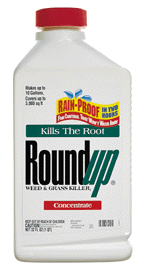RENEGADE GARDENER™
The lone voice of horticultural reason
“Roundup, and its devil-spawn, Kleen-up, are hideous, monstrously toxic chemicals created in smoking vats by evil, monolithic corporate chemical companies who are reaping huge profits while poisoning our children.”
 How can anyone have a problem with Roundup? It kills grass, for God’s sake! Kills it! Dead, dead, dead!
How can anyone have a problem with Roundup? It kills grass, for God’s sake! Kills it! Dead, dead, dead!
I recall sitting in Master Gardener Core Course when our professor for Plant Pathology mentioned matter-of-factly that such-and-such could be handled by spraying it with a little Roundup. One person in the class rose up and darn near walked out when he/she couldn’t get the professor to denounce Roundup as something that a Master Gardener should never recommend for use.
The professor patiently tried to explain the facts. Roundup is a chemical, by name Glyphosate, or isopropylamine salt. Spray it on a plant and it essentially salts it to death, killing the plant by preventing it from making its own food. That’s what goes on when you spray Roundup. Chemists found a chemical that starves plants to death.
That makes it toxic. Anything that kills anything is considered toxic. Very little on the planet is not toxic. Eat enough butter at one time, or asparagus, and you will die. Butter and asparagus are toxic, in that regard. So is beer.
Of course, some people don’t let a little chemistry get in the way of their logic. If it kills plants, it must hurt the environment.
No, it doesn’t. Give industry some credit. About 25 years ago the chemical companies were under severe scrutiny, the EPA was passing tougher laws, and look how industry responded-things changed for the better. Roundup (and Kleen-up, same deal) were the chemists’ answer to one of our concerns. You want something that’s not going to affect soil and ground water, OK, we’ve come up with this.
Roundup is systemic, meaning it is absorbed into the plant, all the way to the roots. The plant starves, dies, then the Glyphosate breaks down in the soil at a very quick rate. It needs the plant to hold together, but the plant is gone. Nothing is left to leech into ground water, nothing remains to “poison” anything.
You can seed an area sprayed with Roundup a week after the application. One of the top native restoration experts in the county was speaking in Minnesota recently, and how do you think his firm starts a native restoration project? They spray the bejeesus out of the area with Roundup.
Children and pets can walk on grass treated with Roundup as soon as it has dried—after about two hours, on a sunny day.
Of course we need to be careful with any chemical. Of course we need the EPA, and other industry watchdogs. But give credit where credit is due. Roundup is the absolute least of your worries.
Don Engebretson
The Renegade Gardener